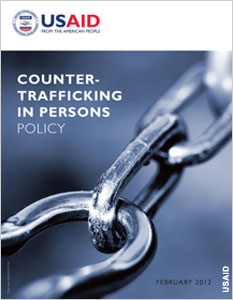Mar. 29: Seattle Times – Washington Gov. Gregoire signs Bill Into Law Pressuring Sellers Of Online Sex Escort Ads
Mar. 12: Citizen Magazine – Stopping Traffic
Media and News Coverage, February 2012
USAID’s New Counter-Trafficking in Persons Initiative
The United States has a long history of helping developing nations around the world. USAID has been the forefront agency involved in extending U.S. assistance overseas from the time it was created in 1961 by President John F. Kennedy. Beginning in 2001, USAID has played a major role in U.S. efforts to eradicate modern day slavery. On February 23, 2012, we were honored to join other leaders in the anti-human trafficking field for the launch of USAID’s new Counter-Trafficking in Persons (C-TIP) initiative.
The Counter-Trafficking in Persons (C-TIP) initiative contains 5 objectives that incorporate the 4 P’s – Prevention, Protection, Persecution, and Partnership – in hopes of reducing human trafficking around the globe.
The five objectives can be broadly separated into two categories:
1. Education: compiling the knowledge of current anti-trafficking methods to improve future endeavors and training for USAID staff members
2. Assistance: integrating human trafficking efforts into already-established programs, and increase investment in high-risk regions
During the launch, Shared Hope was one of only two NGOs noted at the meeting and was commended for our domestic efforts, with special praise for our Rapid Assessments on Domestic Minor Sex Trafficking in Washington, Arizona and Virginia. We were honored to be recognized.
Speakers at the briefing emphasized the utilization of technology to help fight trafficking, as well as increased communication between and among governments, organizations, missions, etc. Technology has already proved its usefulness: two boys enslaved on a fishing boat in Asia saw the Human Trafficking hotline number on MTV, called, and were rescued. Technology and collaboration, coupled with the new C-TIP initiative may help in the decline of modern day slavery.
Media and News Coverage, January 2012
- Jan. 31: Indystar – New Indiana Law Will Strengthen Penalties Against Child Sex Trafficking
- Jan. 30: Courier Journal – Indianapolis child sex trafficking: City plans how to fight it long after Super Bowl
- Associated Press Video – America’s Child Sex Trafficking Report Card
- Jan. 27: Seattle Times – Critics Slam Backpage.com At Legislative Hearing
- Jan. 26: Fox News – Human Trafficking: Hunting The Predator
- Jan. 26: Huffington Post – Nicholas Kristof Blames Backpage For Aiding Child Prostitution
- Jan. 21: Kitsap Sun – Awakening To Real Horror : “Renting Lacy ” Book Review.
- Jan. 4: Washington Times – Virginia’s Struggle To Fight Human Trafficking
Money: Saving and Enslaving America’s Children
This year, President Obama said that combating human trafficking was going to be a top priority, yet the U.S. currently spends more in a single day on drug trafficking than it does in an entire year fighting human trafficking. At a forum hosted by ATEST and the CNN Freedom Project, actress and UN Goodwill Ambassador Mira Sorvino claimed “Every month we spend twice the TIP [Trafficking in Persons] budget on military marching bands.” With the passing of the debt ceiling, which promises trillions of dollars in budget cuts, will President Obama be able to make good on his efforts to fight human trafficking? More importantly, is the U.S. willing to shell out significant change to bring significant change?
A study in Georgia revealed how much it would cost the state to treat a sexually exploited youth. The study found that secure facility residential services cost about $183 a day per child, while home-based services cost only $0.82. If Georgia treated all the known victims of sexual exploitation in the state, which, according to another study from Georgia is about 4,000 per year, Georgia alone would need $732,000 a day to place every victim in a secure shelter that provides essential services for rescue and restoration. Alternatively, if Georgia opted for a home-based care for all 4,000 known survivors, the state could spend a modest $3,280, but would be compromising the level of security and therapeutic care necessary for comprehensive and lasting healing. By using a System of Care Approach, like Child Protective Services (group homes, foster care) rather than incorrectly putting them through the Juvenile Justice System, the state would save $65,870 – $211,930 annually. While this approach is favored for its treatment of children as victims and not as offenders, it would seem to be fiscally responsible as well.
 Legislators are taking note of the need for funding for victim services. Senate bill S. 596 was introduced by Sen. Ron Wyden (D-Ore.) that would allocate six $2-2.5 million block grants a year to six locations deemed to have significant sex trafficking activity. This piece of legislation would be an increase from past funding, and is a step in the right direction when allocating funding for victims, prosecution, law enforcement, and training.
Legislators are taking note of the need for funding for victim services. Senate bill S. 596 was introduced by Sen. Ron Wyden (D-Ore.) that would allocate six $2-2.5 million block grants a year to six locations deemed to have significant sex trafficking activity. This piece of legislation would be an increase from past funding, and is a step in the right direction when allocating funding for victims, prosecution, law enforcement, and training.
Important budget cuts are necessary, but we cannot afford to cut the already measly $17 million dedicated to fight this billion dollar underground industry. The $17 million a year figure becomes even more insignificant as we consider that is the amount the US spends to fight drug trade in one day. Protecting our citizens, especially our youth, should be a top priority—let’s make our federal budget reflect that. Urge your senator to support S. 596 and remind them that the protection of our children’s innocence should never be on the chopping block.






